The ’12 Days of Christmas’ is a classic holiday song first published in its current form in 1908. In a nod to the classic carol, join The Hockey Writers as we count down the 12 Days of Hockeymas. Each day, we will provide you with a piece of hockey history as we eagerly await the start of the 2020-21 NHL season.
On the ninth day of Hockeymas, rather than ladies dancing, let’s appreciate the nine-season streak of playoff appearances in recent San Jose Sharks history. After the 2004-05 lockout, the Sharks were competitive until they fell short of the playoffs in the 2014-15 season.
This run of success saw the team top their division four times and earn their only Presidents’ Trophy. San Jose saw the primes of their franchise’s best players, blockbuster trades, and sadly, playoff heartbreak.
2005-06: A Jumbo Addition
The start of the season is incredibly important, and when a team is not doing well, they must make a move to try to improve their situation. The team was 8-12-4 and on a 10-game losing streak when GM Doug Wilson made the best trade in franchise history. They sent Marco Sturm, Wayne Primeau, and Brad Stuart to the Boston Bruins for Joe Thornton.
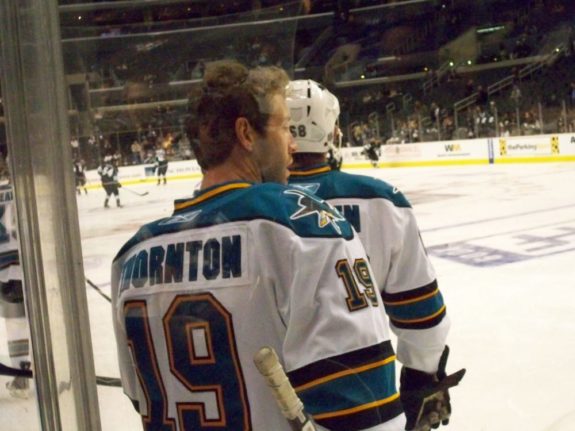
Thornton went on to win the Hart and Art Ross Trophy in 2005-06. He had 33 points in 23 games in Boston ahead of the trade and had 92 points in 58 games with San Jose. He helped winger Jonathon Cheechoo win the Rocket Richard Trophy, edging out Jaromir Jagr by two goals, as he finished with 56. Patrick Marleau had a career-high 86 points, and 21-year-old Milan Michalek played his first full NHL season.
After 99 regular-season points, they finished second in the Pacific Division and were the fifth seed in the Western Conference. After a five-game series win over the Nashville Predators, the Sharks were taken out in six games by the Edmonton Oilers, including a three-overtime loss in Game 3.
2006-07: Jumbo Dominance
In a full season with Joe Thornton, San Jose saw similar success to the previous season. Jumbo Joe had 114 points in 82 games, followed by the only other point-per-game producer Patrick Marleau, with 78 points in 77 games.
Cheechoo led the team with 37 goals, and Michalek emerged as a great top-six winger, with 66 points in 78 games. 19-year-old Marc-Edouard Vlasic played 81 games in a great rookie campaign. Evgeni Nabokov had a .914 save percentage (SV%), well ahead of the league average of .903, and helped the team to second in their division and fifth in the conference yet again.
Similarly, the Sharks defeated the Predators again in the first round, this time in five games. However, the team lost to the top-seeded Detroit Red Wings in six games.
2007-08: Nabokov’s Consistency
The 2007-08 season was characterized by two players: Thornton and Nabokov. Thornton had another stellar campaign, with 29 goals and 96 points. Nabokov, however, played 77 games that season, a career-high, and two off the NHL record for games by a goalie in a season. Despite this, he posted a .910 SV%, comfortably above league average. Posting those numbers and avoiding burnout greatly helped the Sharks.
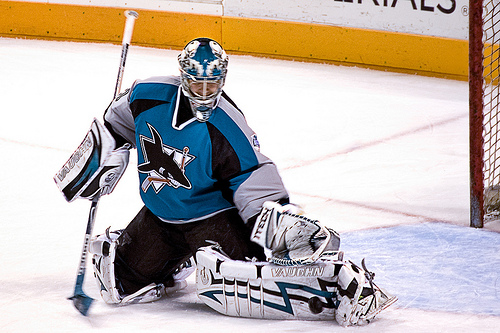
The Sharks acquired Jeremy Roenick ahead of the season, and he had 33 points in 33 games. Michalek was the second-highest scorer on the team, with 24 goals and 55 points, well behind Thornton’s stellar season. Cheechoo was the only other player above 20 goals, potting 23.
Marleau had a total down year, with only 48 points, and 23-year-old Joe Pavelski played his first full NHL season and had 40 points. The Sharks acquired defenseman Brian Campbell at the trade deadline, and he had 19 points in 20 games in San Jose. The Sharks finished best in their division and second in the Western Conference.
After only 15 regular-season games, Ryane Clowe had eight points in a seven-game playoff series win over the Calgary Flames. In the second round, despite a .918 SV% from Nabokov, the Sharks fell to the Dallas Stars in six games.
2008-09: Presidents’ Trophy
This season marked the ascension of numerous Sharks favorites. Most notably, Pavelski, fourth in points on the team and had 25 goals. 22-year-old Devin Setoguchi had 31 goals and 65 points, third on the team. Ryane Clowe played his first full season and had 52 points. Christian Ehrhoff nearly doubled his previous point production and had 42 points. Marleau returned to being a 70-point player, while Thornton had 86 points.
The Sharks made the blue line a key part of their offseason and added two significant players. They acquired Dan Boyle in a large package that included a former first-round pick and a future first-rounder, but his 57-point season made it well worth the risk. Eventual Hall of Famer Rob Blake also joined the Sharks defensive core and enjoyed a 45 point and 110 penalty minute season.
Related: Sharks Prospect to Watch: Yegor Spiridonov
The team saw almost everyone take huge strides; even Nabokov scored a goal with how well the team was doing. All this saw the Sharks win their first and only Presidents’ Trophy, topping the league with 117 points.
However, the team did not make it out of the first round, losing to the Anaheim Ducks in six games. This disappointment saw the team make moves in the offseason to load up on more star power.
2009-10: Dany (All-Star) Heatley
Ahead of the season’s start, the Sharks moved Cheechoo, Michalek, and a second-round pick for all-star Dany Heatley. This move paid immediate dividends, as he finished third on the team in points, scoring 82, with 39 goals. Thornton and Marleau both finished above a point per game and enjoyed the help Heatley provided on their right-wing.
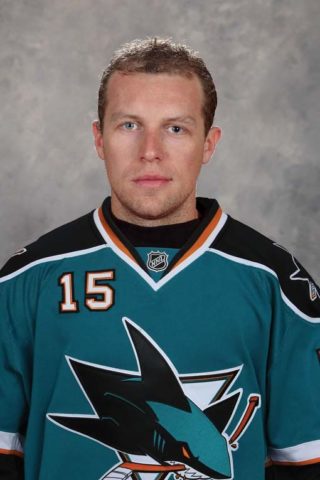
Pavelski, Clowe, and Boyle were the only other players who finished with above 40 points. Nabokov played incredibly well, with a .922 SV% in 71 games. This top-heavy roster went on to top the Western Conference with 113 points.
Despite Boyle’s overtime own goal in Game 3, San Jose won in six games over the Colorado Avalanche in the first round. In the second round, the Sharks won a highly contested series against the Red Wings, even though it was only a five-game series, as they won all their games by one goal. In the Western Conference Finals, the eventual Stanley Cup Champion Chicago Blackhawks quickly swept the Sharks. This postseason, however, was incredible for Pavelski, as he had 9 goals and 17 points in 15 games.
2010-11: A New Netminder
This Sharks season was more characterized by their defense than their goal-scoring prowess. Offensive production was mainly by committee, with seven players scoring 50 or more points, but none over a point per game pace. The newest of these producers was 2007 ninth overall pick Logan Couture, who notched 32 goals and 56 points. Marleau led the team in scoring, with 37 goals and 73 points. New captain Joe Thornton, Pavelski, and Boyle all had successful seasons with over 40 assists.
However, the team was only slightly above average in goals on the season. But they were very effective defensively, letting in 129 goals that season, well under the league average of 147. This was due largely to new goalie, Antti Niemi, who played in 60 games and had a .920 SV%. The team won their fourth straight division title and was second in the conference.
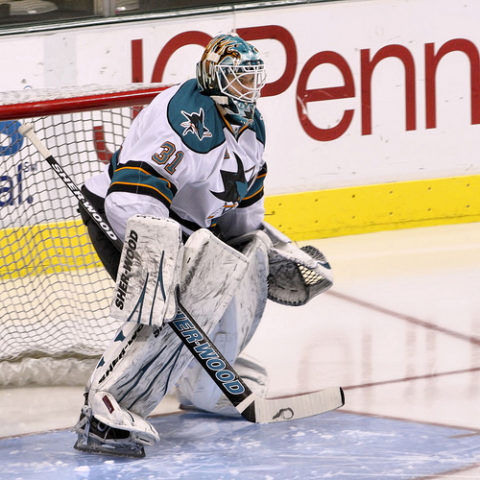
The Sharks won three overtime games en route to defeat the Los Angeles Kings in a six-game series. The next series against the Red Wings was incredible, with all but one game of seven decided by one goal. The Sharks won the first three games, then lost three, but Marleau’s game-winning goal in Game 7 pushed the Sharks into a second straight Conference Finals.
Yet again, the Sharks were quickly taken down in the third round, this time by the Vancouver Canucks. Only a five-game series, the Sharks were no match for the Sedin twins and Ryan Kesler. Despite 17 points from Thornton and 16 from Boyle, the Sharks had to focus on the next season.
2011-12: New Faces
This season saw two new faces join the Sharks. They traded for defenseman Brent Burns, giving up former first-round pick Charlie Coyle, Setoguchi, and a 2011 first-round pick that offseason. The team also acquired Martin Havlat in a one-for-one exchange for Heatley. Neither helped offensive production enough because the team was below average in terms of goals for this season.
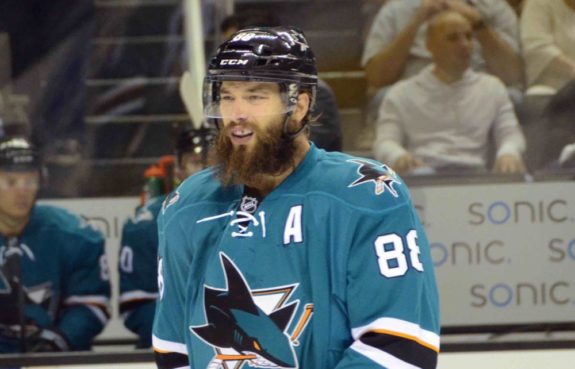
The team was great yet again at not allowing opposing teams to score, allowing 132 goals that season, under the 148 average. This was in large part to Niemi, who in 68 games had a .915 SV%. Interestingly, backup goalie Thomas Greiss had the same SV% in his 19 games of work. But the Sharks were unable to win the division and finished with 96 points, second in the Pacific Division but seventh in the conference.
The Sharks quickly lost this series to the St. Louis Blues. After Havlat scored a double-overtime winner in Game 1, the club lost their next four.
2012-13: The Shortened Season
In this truncated 48-game season, the Sharks had no players over 40 points, and only Thornton, Couture, Marleau, and Pavelski were over 30, while Burns and Boyle both had 20. Point totals would likely have been higher, but the Sharks struggled to have all their players in the lineup, with key members such as Burns, Matt Irwin, Clowe, and T.J. Galiardi missing significant time. The Sharks traded for Raffi Torres who played 11 games at the end of the season.
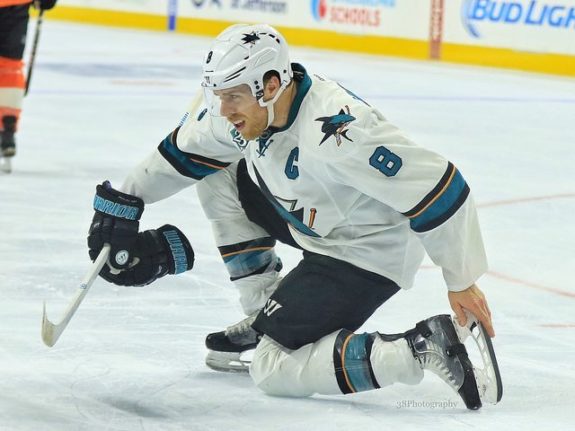
Yet again, the Sharks were sensational at keeping the puck out of their net. The defensive core of Vlasic, Boyle, Douglas Murray, Justin Braun, and the returning Brad Stuart was quite effective. Additionally, Niemi finished third in Vezina Trophy voting, with his incredible .924 SV% in 43 games played. San Jose finished sixth in the conference and third in their division, with 57 points.
The Sharks were able to complete a four-game sweep against the Canucks in Round 1, with two overtime wins. The NHL suspended Torres for the remainder of the Sharks’ playoff run after Game 1, after a charging hit on Jarret Stoll’s upper body. In an extremely hard-fought series, they fell to the Kings in seven games in Round 2. The Sharks leveled the series at 2-2 after losing the first two games at Staples Center. In the seventh game, Justin Williams’ two-goal game was enough to defeat the Sharks 2-1.
2013-14: Return to Offensive Hockey
This season saw both Marleau and Thornton finish with over 70 points. Pavelski headlined the scoring, with 41 goals and 79 points, which were both career highs for him. Burns moved to right-wing from playing defense and handled the transition well, finishing with 48 points in 69 games, while Couture had 54 points in 65 games. Rookie Tomas Hertl burst onto the scene and had 25 points in 37 games before a season ending knee injury.
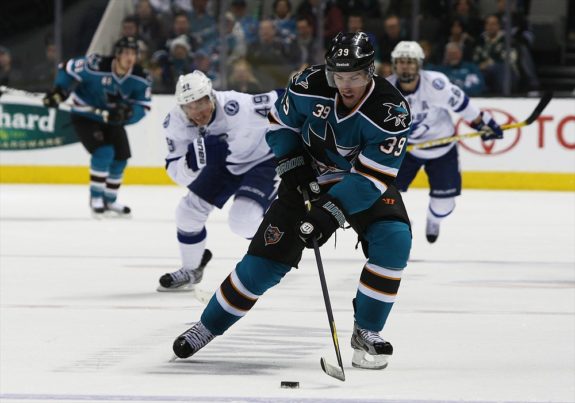
The Sharks were less impressive defensively but were still above average in goals given up this season. The defense was superb, with a similar core to last season and Niemi’s slightly above average season. The Sharks finished second in the division and entered the playoffs with an opportunity to get revenge on their rival, the Kings.
Unfortunately, we know how this story ends. The Sharks took a commanding 3-0 lead in the series. Then, unfortunately for the team, they lost the next four games, sealing the infamous “reverse sweep.”
Conclusion
The Sharks have been part of numerous years of playoff contention, and even after this streak ended, they made the Stanley Cup Final. This run of quality teams is definitely something Sharks fans are to be thankful for.